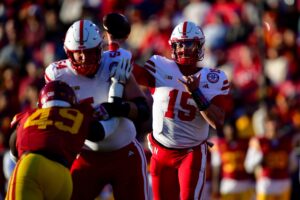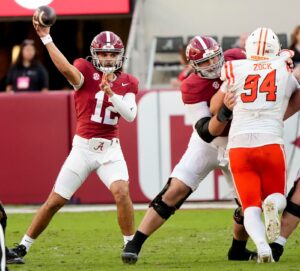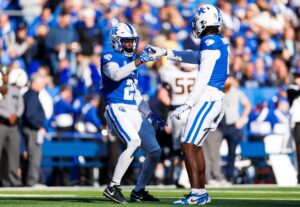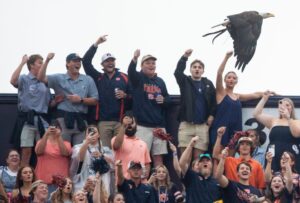Last season, Ed Orgeron led LSU to the Southeastern Conference championship then to the College Football Playoffs. The Fighting Tigers rolled to a 15-0 national championship finish, only the second squad to do so since 1897. Along the way, they amassed numerous records and awards. They launched themselves into the debate as to which team is the greatest in the history of college football. Inevitably, the question has popped up in the aftermath: can the Tigers repeat as champions? History Is Against LSU Repeating.
History Is Against LSU Repeating As National Champions
A review of the history of LSU’s football program suggests that the goal seems unattainable. Several obstacles, some never previously surmounted, lay in front of the 2020 Fighting Tigers.
Difficulty In Repeating As SEC Champions
LSU has secured the Southeastern Conference’s football championship 12 times, fourth most in the history of the SEC. However, LSU has not garnered consecutive SEC titles since winning outright championships in 1935 and 1936.
Could LSU actually fall short of repeating as SEC champions yet still advance to the CFP? A few teams have managed that feat. Ohio State did not win the Big Ten championship in 2016 nor did Alabama win the SEC in 2017. Nevertheless, both received invitations to the CFP in those seasons.
Struggles In SEC Games On The Road
The Southeastern Conference reformatted its schedule starting with the 1992 season. That change arranged for LSU to play at Arkansas, Auburn and Florida in even-numbered years. LSU has never won at all three venues in the same season. In fact, LSU has only managed to win at two of the three venues in four seasons (1996, 2004, 2012 and 2018).
During this 27-year span, LSU has struggled on the road against all three. Against Arkansas, either in Fayetteville or in Little Rock, LSU has a record of 7-7. At Auburn and at Gainesville, LSU holds the same tally: 5-9.
Failure To Follow Up Previous National Championships
LSU has merited the title of national champions according to the Associated Press, the coaches’ poll or a combination thereof four times: 1958, 2003, 2007 and 2019. The following reveals how the Fighting Tigers fared in the seasons following their previous national championships.
1959: LSU appeared to be headed for a repeat as both SEC and national champions. The Tigers started 7-0, including four shutouts. Then, they endured a defensive tussle with Ole Miss, ranked number three in the AP poll. Thanks to Billy Cannon’s punt return in the fourth quarter for a touchdown and last-minute goal-line stand, LSU escaped with a 7-3 victory. The following week at Tennessee, head coach Paul Dietzel decided to go for a two-point conversion after scoring a touchdown in the fourth quarter. The Volunteers stopped Cannon short of the goal-line, resulting in a 14-13 defeat.
Although finishing 9-1, the Tigers failed to repeat as champions of the SEC. They headed to the Sugar Bowl with three injured starters in the backfield for a re-match with Ole Miss. The Rebels’ 21-0 shutout on New Year’s Day left a bitter taste at the end of what appeared as another probable great season through Halloween.
2004: The season opened with a nail-biting victory at home versus Oregon State. Two weeks later, a controversial penalty allowed Auburn to re-kick the game-winning extra point with less than two minutes left in the game. Two weeks later, Georgia exacted revenge for its two losses to LSU in the prior season. The Bulldogs raced to a 24-0 advantage midway through the second quarter then added three more touchdowns in the second half for a 45-16 rout. After the first week of October, LSU was realistically eliminated from the race for the SEC championship.
Despite the ensuing six straight wins, the season had a sour ending. First, Nick Saban announced on Christmas afternoon that he was leaving to become head coach of the Miami Dolphins. Then, the Tigers headed to Orlando for a New Year’s Day match-up with Iowa, speculation about his replacement clouding pre-bowl practices. JaMarcus Russell seemed to spark the sluggish LSU offense after two other Tiger quarterbacks had struggled. He guided LSU to the endzone twice in the fourth quarter to grab the lead. However, Iowa scored on a desperation 56-yard touchdown pass on the final play of the game to end the season at 9-3. The ignominious conclusion ruined Saban’s final game at LSU, a black mark on an otherwise successful tenure in Baton Rouge.
2008: Les Miles jettisoned the presumed starting quarterback, Ryan Perrilloux, before the season opener. Nevertheless, the Tigers started out 4-0 in September with two victories in the SEC. Andrew Hatch started the season until leaving the third game, at Auburn, with a season-ending injury. Jarrett Lee replaced Hatch then led the Tigers to the game-clenching touchdown with 63 seconds remaining in the game.
As a starter, Lee threw at least one interception returned for a touchdown in five of his eight starts. As a result, LSU plummeted through October and November, winning only one of its six remaining conference games. That lone win, at South Carolina, was not secured until scoring a touchdown less than five minutes remaining in the game. They also had to score 30 points in the fourth quarter versus Troy, the largest comeback in program history, to escape with a victory. The defending national championships finished the regular season 7-5 and out of both major polls. The 38-3 demolition of Georgia Tech, ranked number 14 in the AP’s poll, in the Peach Bowl on New Year’s Eve slightly mitigated the bitterly disappointing season.
No Friendly Venue For The National Championship Game
Coincidently yet incredibly, in every season that LSU won or at least played with the national title at stake, the game took place less than 100 miles from its campus. The Associated Press’ and coaches’ polls crowned the Fighting Tigers as national champions at the end of the regular season in 1958. LSU justified its title by shutting out Clemson, 7-0, in the Sugar Bowl. In the 2003 season, LSU defeated Oklahoma in the Sugar Bowl, which served as the site for the national title game. The Tiger met Ohio State in the BCS National Championship Game at the end of the 2007 season, also in New Orleans. Of course, last season’s College Football Playoff Final also happened in the Superdome.
Miami Gardens in Florida will host next season’s national championship. Therefore, that would mean an unfamiliar venue for an aspiring team of Tigers seeking to repeat. In fact, LSU has not played in the Miami metropolitan area since appearing in the Orange Bowl at the end of the 1982 campaign.
What Do All of These Portend?
In reality, all of these factors deal with past shortcomings. The inability to sweep contests in Fayetteville, Auburn and Gainesville is not destined. Struggles to follow up championships are not fated to occur again. Ghosts of bygone seasons cannot affect the current squad unless they allow themselves to believe that failure is inevitable. Does Ed Orgeron, along with his coaches and players, possess the capabilities to shatter these historical barriers?






